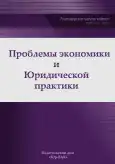Bona Fides in Procedural Relations Related to the Protection of Property and Family Rights
- Authors: Glebovsky Y.A.1,2
-
Affiliations:
- the Frunzensky district court of Vladimir
- Vladimir State University named after A.G. and N.G. Stoletov
- Issue: Vol 18, No 6 (2022)
- Pages: 83-88
- Section: Articles
- URL: https://journal-vniispk.ru/2541-8025/article/view/147294
- ID: 147294
Cite item
Abstract
The purpose of the study is to study theoretical approaches and judicial practice regarding the application. the principle of good faith in property family disputes. Using a functional, general theoretical and comparative legal method of research, attention is drawn to the special role in resolving family disputes, including property disputes based on good faith, given that a property dispute in the family sphere is always associated with personal relationships between family members. Especially the conscientious behavior of the participants in the family dispute must be taken into account and taken into account when the property dispute of the spouses affects the interests of the children. The article concludes that in property family disputes there is an active mediation function of the court aimed at settling the family conflict by concluding a settlement agreement. It is noted that the principle of a good-council meeting of the parties to a family dispute should be implemented at the stage of execution of a judicial act, since not a good-council meeting of the parties entails the occurrence of administrative disputes involving spouses, other family members with enforcement agencies. The family dispute and the outcome of its resolution flows into the public sphere. In the case when a family property dispute affects the interests of children, procedural legislation, including legislation on enforcement proceedings, should contain provisions that enshrine the obligation of the parties to the dispute to act in good faith, but also to cooperate with the court, and in the process of enforcement and with the enforcement authority.
About the authors
Yaroslav A. Glebovsky
the Frunzensky district court of Vladimir; Vladimir State University named after A.G. and N.G. Stoletov
Email: a2209@mail.ru
Judge; Associate Professor of the Department of «Judicial activity» Law Institute Vladimir, Russian Federation
References
- Abolonin S.O. The principle of good faith and partnership in the «new» civil process // Arbitration and civil processes. 2013. No. 8. p. 3.
- Bespalov Yu.F. Family legislation of the Russian Federation: some defects, problems of law enforcement and areas of improvement // Family and housing law. 2018. No. 2. pp. 4-7.
- Belyakova A.V. Problems of protection of the right to legal proceedings within a reasonable time in civil and arbitration proceedings in the Russian Federation: Dis. ... Kandy. yu. nauka. -M., 2018. -p. 116.
- Valeev D.H. The system of the process of guaranteeing powder citizens and the organization in the performance of production of the abstract. dis.... Candidate of Technical Sciences. dissertation of Dr. Phil. sciences. Yekaterinburg, 2009. pp. 26-27.
- Volodarsky D.B., Kashkarova N. K. The question of the reception of the doctrine: procedural aspect // Right. 2021. No. 7. pp. 106-116; No. 8. pp. 131-152.
- Mikhailova I.A. Consent to commit acts by a person who does not enjoy trust: a practical and theoretical problem // Law of Russia: review, analysis, practice. 2015. No. 1. pp. 8-13.
- Nizamieva O.N. On the prospects for the development of contractual regulation of family relations// Scientific notes of Kazan University. The series «Humanities». 2011. p. 103.
- Ruzanova V.D. Problems of legal regulation of relations with the participation of children // the rights of the child in the Russian Federation: legislation, law enforcement, Russian science: materials of scientific and practical International business / ed. by Yu.F. Bespalov. M. RG-press, 2018. p. 170.
- Stepanenko R.F., Hamidullinna F.I., Yakushev P.A. Family law of Russia and the states of Europe: textbook. -M.: Prospect, 2023. p. 110.
- Family law: a textbook / edited by P. V. Krasheninnikov. 4th ed., reprint. and aug. -M.: Statute, 2019. p. 4.
Supplementary files








